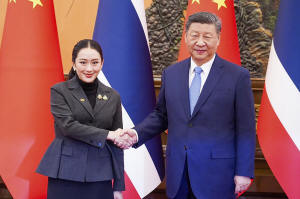China's Xi and Thailand's leader vow to crack down on scam networks that
plague Southeast Asia
 Send a link to a friend
Send a link to a friend
 [February 06, 2025]
By HUIZHONG WU [February 06, 2025]
By HUIZHONG WU
BANGKOK (AP) — China's leader Xi Jinping and visiting Thai Prime
Minister Paetongtarn Shinawatra vowed to crack down on the scam networks
that plague Southeast Asia as the two leaders met on Thursday in
Beijing.
Myanmar, Cambodia and Laos, which are south of China and share borders
with Thailand, have became major centers of online scam operations where
people lured by false advertising of well-paid jobs are trafficked to
secretive compounds where they are forced to work by criminal groups
that run online scams targeting people all over the world.
That has impacted Thailand’s reputation, as multiple high-profile
stories of Chinese people being lured to work in Bangkok only to be
trafficked into a scam compound in Myanmar have surfaced, with Chinese
actor Wang Xing being the latest such victim.
Thai and Chinese officials have taken public steps to address the scam
issue, including a reported visit to the border region by Liu Zhongyi,
China’s vice minister of public security.
“China appreciates Thailand’s strong measures to combat online gambling
fraud. Both sides should continue to strengthen law enforcement,
security, and judicial cooperation," Xi said, according to state
broadcaster CCTV.

Paetongtarn echoed that, saying “Thailand is willing to strengthen law
enforcement cooperation with China and other neighboring countries and
take resolute and effective measures to combat cross-border crimes such
as online gambling and fraud.”
Ahead of her visit, Thailand cut off electricity to some areas in
Myanmar by its border to try to disrupt the operations of the scam
compounds. The effect of that is unclear as the compounds often have
their own generators.
The visit to China was Paetongtarn's first as prime minister and comes
as the two countries celebrate 50 years of establishing diplomatic
relations.
[to top of second column]
|

In this photo released by the Thailand's Government Spokesman
Office, Chinese President Xi Jinping, right, shakes hands with
Thailand's Prime Minister Paetongtarn Shinawatra in Beijing, China,
Thursday, Feb. 6, 2025. (Thailand's Government Spokesman Office via
AP)

On other bilateral issues, Xi said China was willing to work on a
new railway project between the countries. On Tuesday, Thailand
approved a $10 billion railway project that will eventually connect
Bangkok to the Laos-China high speed railway. He also said they
hoped to deepen cooperation in electric vehicles, with Thailand
being an emerging market for Chinese automakers.
China was once a significant part of Thailand’s tourism segment but
was down to 6.7 million visitors in 2024, less than the 11 million
visitors in 2019 before the coronavirus pandemic when Chinese
visitors were nearly a third of all arrivals.
Paetongtarn has shown Thailand is willing to accommodate Chinese
interests on key issues.
In January, a group of Chinese Uyghur detainees in Thailand pleaded
for help before they were deported to China. Thailand’s decision to
deport the Uyghurs, a largely Muslim ethnic group that faces
persecution, came ahead of the two countries 50th anniversary of
relations.
After the meeting in beijing, Paetongtarn said that Thailand
"firmly" abides by the one-China principle, Beijing's position that
the island of Taiwan is part of China.
___
Associated Press writer Jintamas Saksornchai contributed to this
report.
All contents © copyright 2025 Associated Press. All rights reserved |